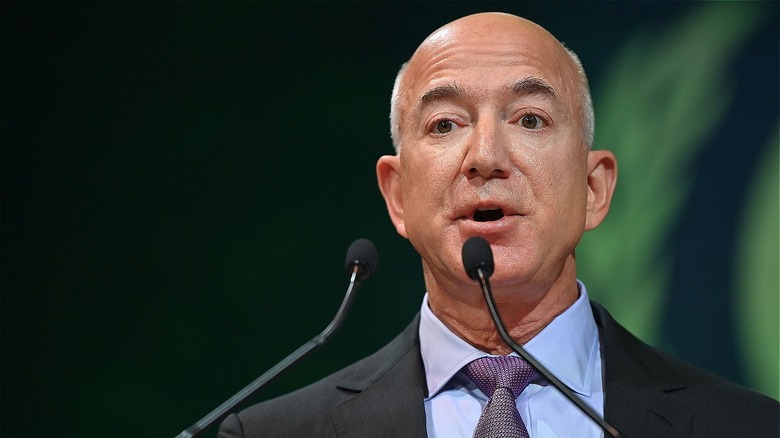Advice From Jeff Bezos That Will Change Your Approach To Business
Jeff Bezos is the pioneering founder of e-commerce giant Amazon, which today ships roughly 1.6 million packages daily around the globe (or about 18.5 every second!). The company was launched in Bezos' garage in 1994, and about 10 years later the brand introduced perhaps its most important feature (both for the company's revenue and individual shoppers' ease of use): Amazon Prime.
Prime is a monumentally valuable asset for the Amazon brand, acting as a de facto tool to increase the spending habits of Amazon Prime members, of which 6here are some 230 million worldwide. This and other Amazon features and functions came under the leadership of Bezos, who only left the company as its CEO in 2021. (You can read Money Digest's take on Amazon Prime's perks and if they're worth the subscription cost.)
Jeff Bezos is an active entrepreneur who pursues a range of interests and business opportunities beyond his prior day job, though. Blue Origin and The Washington Post are just some of Jeff Bezos' other pursuits. In all of his passions, Bezos is a firm believer in a principled approach to business management and innovative growth. He's a high-impact thinker and believes firmly in the value of letting thoughts come to fruition all on their own. The following advice from Amazon's founder may just shift the way you think about starting and running your own business and in pursuing your investment dreams.
'Be afraid of your customers, not your competition'
Jeff Bezos has consistently presented himself as a business leader who keeps his eye on the prize. The Amazon founder in 2007 recounted to Harvard Business Review that he once suggested at an all-hands meeting a different sort of focus than might appear typical. "Be afraid of our customers, because those are the folks who have the money," he mused. This is a somewhat novel take, since brands often focus on the competition rather than the customer as a primary point of vulnerability.
Bezos noted that Amazon's competitors were never going to send the business money, and so the main target of anything the company did should surround the customer experience rather than the competitive marketplace. An important takeaway from this change in focus is the reality that doing right by your customers brings about success far more consistently than simply one-upping your competition.
If you don't satisfy your customers' needs, they will begin to look elsewhere for solutions to their problem areas. And if the market is particularly devoid of specific solutions, an industrious customer might opt to create it themselves, introducing brand-new competition into the world. Focusing on your customers helps drive profits, but also builds valuable relationships while solving customer needs reliably and effectively.
'Make high quality, high velocity decisions'
Many business leaders struggle with the decision-making process. The responsibility inherent to high-quality business leadership acts as a pressure cooker that brings a wide range of challenges to the workplace at blistering speeds. Jeff Bezos urges business professionals to focus less on the weight of decisions and more on the "nimbleness" of vision and implementation. For Bezos, "high quality, high velocity decisions" are a critical aspect behind the success of an innovative brand.
These insights come from Jeff Bezos' 2015 Amazon shareholder letter, where he speaks about how making quality decisions shouldn't be hamstrung by the relentless pursuit of correctness. The desire to get things right can be a potent stumbling block, especially for those who are early in their careers. Making mistakes is simply part of the business experience, and Bezos is quick to point out that most decisions can be altered in the event that a change of course becomes necessary. "They're two-way doors," he said.
As a result of this new mindset for decision-making, it becomes clear: The process should take on a heightened speed. Changes can be made, as well as processes improved upon, so if you find yourself in a leadership position, you should make decisions decisively and quickly in order to make the most of the time before you. Risk aversion only serves to hinder your business's progress in the long term; the more you engage directly with your brand, the better your instincts will become. High-velocity decision-making begets a more agile business that's ready for whatever the market may throw at it.
'The world wants you to be typical. Don't let it happen'
Jeff Bezos is a major proponent of individuality, originality, and distinctiveness — both in business and in personal life. In his 2020 letter to Amazon shareholders, the final installment of Bezos' annual contributions at the helm of the company, he said: "We all know that distinctiveness — originality — is valuable ... The world wants you to be typical — in a thousand ways, it pulls at you. Don't let it happen." It's easy for business professionals to lose sight of the originality that makes them unique as they strive to fit neatly into the marketplace of ideas and products. Remaining atypical in the things you offer your clients to retain a unique selling point and business angle is obvious. But the ways in which you operate can easily fall into the same pattern that others rely on.
This is particularly valuable advice for small business owners who naturally become positioned as a central figure in the ongoing day-to-day operations of the brand. The reality is that you're an integral feature of the brand itself and so losing your originality and personal flair forces the business to lose something as well. Bezos notes that remaining true to yourself isn't always easy, but "it's worth it."
'What's not going to change in the next ten years?'
Many people in the business world focus on meeting the changes and challenges of the future head on. Preparing for the world as it will be is an effort in producing a first-mover advantage. Bill Gates offers his take on change, suggesting "we always overestimate the change that will occur in the next two years and underestimate the change that will occur in the next 10." Jeff Bezos turns the query of future movement on its head, though. Rather than contemplating the changes that will revolutionize any industrial space, he focuses on what won't change over this time.
"When you have something that you know is true, even over the long term, you can afford to put a lot of energy into it," Bezos once explained. Instead of trying to predict the future, Bezos looks to the underlying realities of the present and considers what features won't change in the future in order to invest company resources for maximum efficiency. At Amazon, Bezos and his team realized that e-commerce wasn't a fad or flash in the pan, and so they focused on 1) fast delivery and 2) convenient pricing to corner the emerging market while others may have instead sought novelty angles in the space.
Embrace 'the power of wandering'
In his 2018 address to Amazon shareholders, Jeff Bezos dedicated a section of thoughts on what he called "the power of wandering." He hailed the value of curiosity and exploration, and suggested that "wandering is an essential counterbalance to efficiency." Both features must be present in a business in order for it to enjoy the full spate of success available to it.
Jeff Bezos noted that efficiency is powered by structured plans and goal-oriented task creation. In business, these often feature prominently as a road marker for how to get where the leadership team wants to go. Yet, businesses must rely on gut instincts and the innovative vision of individuals in order to develop these plans in the first place.
Bezos accepts that curiosity and mental wandering can seem somewhat random. But they aren't aimless and can help you and your business identify new key areas of growth and uncover potential opportunities and challenges that would otherwise have remained in your blind spot. Every business needs a healthy dose of both patient management and unstructured exploratory mentalities. When paired together, these two opposites create the conditions for long-term success and a thriving business that's ready to meet any challenge it may face.





